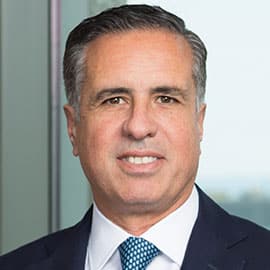

JPMorgan Chase is looking at using artificial intelligence to design algorithms that will help define the optimal rotation for staff in a hybrid model where they working from both home and the office.
The Covid-19 pandemic resulted in approximately 95% of JPMorgan Chase’s staff having to adapt to working from home in a very short period of time.
Daniel Pinto, co-president and chief operating officer of JPMorgan Chase and chief executive of the corporate and investment bank, was interviewed at the ISDA AGM. He said the scenarios where the bulk of staff work from home or where the bulk of staff work in the office are both a very low probability.
ISDA CEO @ScottOMalia talks to Daniel Pinto, co-president & COO JPMorgan Chase and CEO, Corporate & Investment Bank, JP Morgan, about the challenges and opportunities in financial markets #isdaagm @ISDAConferences @jpmorgan
— ISDA (@ISDA) May 11, 2021
Pinto continued that he likes the hybrid model as long as it is very well organised and well designed for the needs of each component of the business.
“If you were to go to working from home for a long period of time, I think you will destroy the culture of the company, kill innovation and the good that can come from personal interactions on daily basis,” added Pinto. “We have been in discussions with Manuela Veloso, head of our artificial intelligence research labs, in creating algos to help us to define optimal rotation based on the constraints of each business.”
Pinto believes that the hybrid model is the way forward and and that over the medium to long-term, the bank will reduce its real estate footprint.
“That has many good things such as being good for the environment but also creates the issue of constantly testing resiliency as you rotate between office and home,” he added. “So we will be better prepared than we we were the first time around.”
Automation
As a result, Pinto said the trend of digitalization and automation that has been happening for a number of years will continue and accelerate.
JP Morgan trades all liquid assets electronically and only manually trades very large deals or very complex transactions that are difficult to standardize. However, automation is now affecting the pre-trade and post-trade processes almost across asset classes.

Daniel Pinto, JPMorgan Chase
“By automating more of the flows from the back to the front office, you will make the cost of trading lower and lower, “ Pinto added.”Therefore, the ability to process huge number of transactions is becoming a reality.”
In addition, he said firms need to invest in smarter algos to create the best possible execution.
“The moment your algos are a bit off-tune, flow will divert somewhere else,” he said. “So all this automation and digitization creates the need for big-scale players that are able to invest across the whole process from pre-trade to post-trade , as well as execution, and that will concentrate the industry further.”
ESG
Pinto continued that environmental, social and governance strategies are a central topic in every client conversation, everywhere in the world.
“I don’t remember any recent meeting, any conversation with any client in the fund management industry or corporate sector, where ESG doesn’t come up,” he said.
JPMorgan Chase said in April 2021 that it aims to finance and facilitate more than $2.5 trillion through the end of 2030 to advance long-term solutions that address climate change and contribute to sustainable development.
.@JPMorgan has just announced we will aim to finance and facilitate more than $2.5 trillion over 10 years to advance long-term solutions that tackle climate change ? and further sustainable development▶️ https://t.co/2eaVoPjUYT /2
— ChukaUmunna (@ChukaUmunna) April 19, 2021
The firm will share an update and additional information on its Paris-aligned strategy with the release of its annual ESG report this month. In addition, last year the bank also established the J.P. Morgan Development Finance Institution (DFI) to grow the development finance activities undertaken by J.P. Morgan and attract additional investment to emerging markets.
Pinto said: “The $2.5 trillion is important and most likely will be a bigger number as the economy progresses and this becomes more central to what we do.”
In addition to announcing financing, Pinto said it is important how the business is run on a daily basis and and how ESG is embedded.
“This includes everything that makes the company sustainable,” Pinto added. “We are carbon neutral at the moment and we will continue to invest in developing this agenda for our own company.”
In addition, the bank has announced that it will work with clients in certain sectors such as auto, energy, oil and gas to transform and align with the Paris climate agreement.
He continued that banks can help facilitate greater trading and liquidity in a voluntary carbon market to help corporates reach net zero. However, Pinto said carbon markets are fractured with fragmented regulatory regimes and a lack of standardization.
Libor
Another big theme is the transition from Libor to risk-free reference rates.
After the financial crisis there were a series of scandals regarding banks manipulating their submissions for setting benchmarks across asset classes, which led to a lack of confidence and threatened participation in the related markets. As a result, regulators have increased their supervision of benchmarks and want to move to risk-free reference rates based on transactions. The UK has chosen Sonia as its risk-free rate while US regulators have chosen SOFR to replace US dollar Libor.
Edwin Schooling Latter @TheFCA talks about the future of US dollar LIBOR #isdaagm @ISDAConferences pic.twitter.com/ZAHg0JSN4X
— ISDA (@ISDA) May 10, 2021
In March this year the UK Financial Conduct Authority confirmed that Libor settings will either cease to be provided by any administrator, or no longer be representative, immediately after 31 December 2021 for all sterling, euro, Swiss franc and Japanese yen settings, and the one-week and two-month US dollar settings. The remaining US dollar settings will end immediately after 30 June 2023.
“The announcement from the FCA this year is extremely important and has been done in a very smart way,” said Pinto. “It will reduce the potential litigation costs substantially to pretty much zero.”
However the UK has create a term Sonia rate, while the US does not yet have a term SOFR. He welcomed CME Group creating a term SOFR based on futures and Bloomberg creating a short-term bank yield index (BSBY) but does not want a proliferation of different indexes.
“In the US it would help to have clarity from regulators on which index can be used and which cannot,“ Pinto added. “But I feel a lot more comfortable with where we are now, than a few months ago.”
Brexit
The UK has exited the European Union, which has only granted temporary equivalence on EU and UK clearing. Pinto said JP Morgan had prepared for Brexit happening without any deal and clients have been trading normally.
“The problem is that banks are really struggling with returns and Brexit creates a market bifurcation and a layer of inefficiency,” added Pinto. “Over time the situation will hopefully improve.”
Brexit creates a market bifurcation, which creates inefficiency and therefore costs that will affect banks, says Daniel Pinto #isdaagm @ISDAConferences
— ISDA (@ISDA) May 11, 2021
He noted that the bank had 17,000 employees in UK at the end of 2017. It will have 19,000 by the end of 2022, even after moving some people to Europe, as the bank is hiring for technology roles in cities such as Bournemouth and Glasgow and launching a retail offering in the UK.
Pinto continued that one priority in the years to come is the massive transformation in technology and how a legacy company changes into an agile environment for fast development that incorporates artificial intelligence.
“I know that transformation is very expensive, and not just about moving infrastructure to the cloud but also about retraining and upgrading developers,” he added. “To future-proof a company you have to go though that painful process of change and we are not going to be the exception.”
Other priorities are adapting to electronification and changing market structure, payments and the transformation of the asset management industry as margins are compressing.




